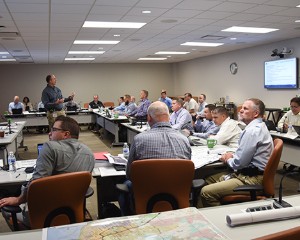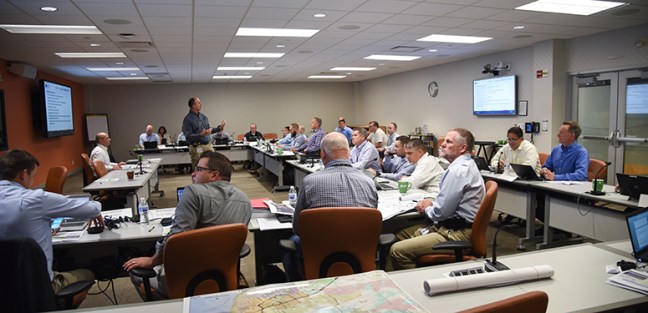Staff from PJM Interconnection and Williams came together at the PJM offices recently to coordinate their responses to a simulated pipeline outage in the midst of a winter cold snap, in the first of what will be an annual exercise to improve how the natural gas pipeline system and the electric grid work together under stressed conditions.
PJM, which operates the electrical grid in 13 states and the District of Columbia, has made it a priority to improve coordination with the natural gas industry, whose pipelines supply the gas-fired generators that make up a growing component of the resources serving 65 million people in the PJM footprint. Natural gas, which fueled about 7 percent of PJM’s electricity a decade ago, now fuels more than 30 percent of its electric generation.
To improve their mutual understanding of shared dependencies in the gas and electric systems, more than two dozen PJM and Williams staff examined incident response, operational coordination, communications, procedures and policies during a day-long practice exercise at the PJM campus in Valley Forge, Pennsylvania.
Presented with the drill scenario of an unexpected pipeline outage during a severe, multi-day deep freeze, teams huddled to coordinate responses and strengthen partnerships to preserve both gas and electric service during the simulation, which would potentially threaten up to 4,800 MW of power supply. (One megawatt powers about 800 homes.)
The exercise is critical to ensure both the reliability of the grid in the short term – keeping the power flowing without interruption – and the resilience to operate through, and bounce back from, a larger-scale, longer-term event. Mike Bryson, PJM Interconnection’s senior vice president of Operations, told the teams that exercises that build relationships, assess conditions, share operational responses and coordinate recovery tactics for challenging circumstances are of paramount importance.
“If we can identify areas that need improvement and then implement those improvements, that’s a win,” Bryson told the two dozen professionals involved in the exercise. “This is an important opportunity.”
For Williams, the exercise represents an important opportunity to strengthen relationships and establish clear expectations with PJM so that the two organizations are prepared to coordinate closely in the event of an actual emergency response situation.
“There is nothing more important to Williams than the safety and reliability of our natural gas pipeline network,” said Rich Truxell, Williams Pipeline Control Manager. “We appreciate the opportunity to partner with PJM to ensure our incident response procedures are well-coordinated in the event of an actual service interruption.”

